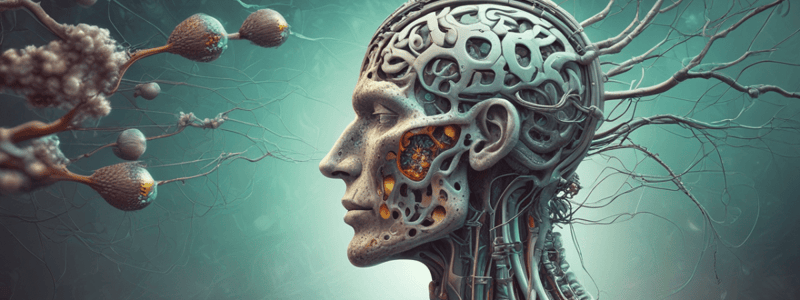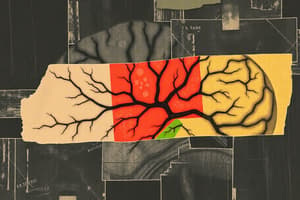Podcast
Questions and Answers
What is the outcome when an animal has vestibular disease?
What is the outcome when an animal has vestibular disease?
- They have no impact on their movement.
- They have enhanced extensor tone on both sides.
- They have improved balance and equilibrium.
- They have difficulty moving. (correct)
What happens when there is a lesion on one side of the vestibular system?
What happens when there is a lesion on one side of the vestibular system?
- There is no effect on the extensor muscles.
- There is an increase in facilitation of the extensor muscles on the same side.
- There is a lack of facilitation of the extensor muscles on the opposite side.
- There is a lack of facilitation of the extensor muscles on that side. (correct)
In which direction will the normal side of the body push the head and body in a vestibular lesion?
In which direction will the normal side of the body push the head and body in a vestibular lesion?
- In a circular motion.
- Towards the abnormal side. (correct)
- In a random direction.
- Towards the normal side.
What is the direction of the head tilt in a patient with a vestibular lesion on the left side of the brain?
What is the direction of the head tilt in a patient with a vestibular lesion on the left side of the brain?
What type of nystagmus is a sign of vestibular disease?
What type of nystagmus is a sign of vestibular disease?
What is the characteristic of jerk nystagmus?
What is the characteristic of jerk nystagmus?
In jerk nystagmus, which direction does the fast phase of eye movement occur?
In jerk nystagmus, which direction does the fast phase of eye movement occur?
Which breed is more predisposed to pendular nystagmus due to a congenital defect?
Which breed is more predisposed to pendular nystagmus due to a congenital defect?
What percentage of decussation is seen in the optic nerve of mice?
What percentage of decussation is seen in the optic nerve of mice?
What is the primary function of the vestibular system in controlling posture?
What is the primary function of the vestibular system in controlling posture?
What is a common clinical sign of vestibular dysfunction in animals?
What is a common clinical sign of vestibular dysfunction in animals?
What is the significance of vomiting in motion sickness?
What is the significance of vomiting in motion sickness?
What is the primary difference between a patient with vestibular dysfunction and a patient with a vision or cerebral cortex issue?
What is the primary difference between a patient with vestibular dysfunction and a patient with a vision or cerebral cortex issue?
What is the function of the vestibulospinal nerves in the vestibular system?
What is the function of the vestibulospinal nerves in the vestibular system?
What is the significance of a severe presentation of vestibular signs in an animal?
What is the significance of a severe presentation of vestibular signs in an animal?
What is the primary role of the vestibular system in controlling posture?
What is the primary role of the vestibular system in controlling posture?
What is the direction of the fast phase of jerk nystagmus if the lesion is on the right side of the brain?
What is the direction of the fast phase of jerk nystagmus if the lesion is on the right side of the brain?
What type of jerk nystagmus is characterized by both eyes moving in the same direction?
What type of jerk nystagmus is characterized by both eyes moving in the same direction?
What is the cause of spontaneous nystagmus?
What is the cause of spontaneous nystagmus?
What is the function of the vestibulocochlear reflex?
What is the function of the vestibulocochlear reflex?
What is the normal response when a doctor turns a patient's head to the left during a physical exam?
What is the normal response when a doctor turns a patient's head to the left during a physical exam?
What type of nystagmus is generated when the head turns and the eyes remain fixed on the original field of vision?
What type of nystagmus is generated when the head turns and the eyes remain fixed on the original field of vision?
What is the primary difference between central vestibular dysfunction and peripheral vestibular dysfunction?
What is the primary difference between central vestibular dysfunction and peripheral vestibular dysfunction?
What is required for the reflex eye movement pattern in physiological nystagmus?
What is required for the reflex eye movement pattern in physiological nystagmus?
Which of the following symptoms is more likely to indicate central vestibular dysfunction?
Which of the following symptoms is more likely to indicate central vestibular dysfunction?
What is the direction of the slow phase of physiological nystagmus?
What is the direction of the slow phase of physiological nystagmus?
Which type of nystagmus is more benign than jerk nystagmus?
Which type of nystagmus is more benign than jerk nystagmus?
What is the primary indication for treatment of peripheral vestibular dysfunction?
What is the primary indication for treatment of peripheral vestibular dysfunction?
What is the likely diagnosis for a cat presenting with vestibular ataxia and horizontal nystagmus?
What is the likely diagnosis for a cat presenting with vestibular ataxia and horizontal nystagmus?
Which of the following clinical signs can indicate either central or peripheral vestibular dysfunction?
Which of the following clinical signs can indicate either central or peripheral vestibular dysfunction?
What is the significance of vertical nystagmus in a patient with vestibular dysfunction?
What is the significance of vertical nystagmus in a patient with vestibular dysfunction?
What is the primary complaint of animals with vestibular dysfunction?
What is the primary complaint of animals with vestibular dysfunction?
What is the primary focus when investigating vestibular disease?
What is the primary focus when investigating vestibular disease?
What is the most common cause of vestibular dysfunction in dogs and cats?
What is the most common cause of vestibular dysfunction in dogs and cats?
In which age group is idiopathic vestibular disease most common in cats?
In which age group is idiopathic vestibular disease most common in cats?
What is the typical prognosis for idiopathic vestibular disease?
What is the typical prognosis for idiopathic vestibular disease?
How is idiopathic vestibular disease typically diagnosed?
How is idiopathic vestibular disease typically diagnosed?
What is a characteristic of idiopathic vestibular disease in dogs?
What is a characteristic of idiopathic vestibular disease in dogs?
Flashcards are hidden until you start studying
Study Notes
Optic Nerve (CN2) Decussation in Different Species
- Birds and Lizards: 100% no consensual pupillary light reflex (PLR)
- Mice: 97% not detectable consensual PLR
- Large animals: 80-90% very weak consensual PLR
- Dogs: 75% direct PLR is better than consensual PLR
- Cats: 65% direct PLR is better than consensual PLR
- Primates: 50% direct PLR is equal to consensual PLR
Vestibular Dysfunction: Clinical Signs
- Motion sickness (vomiting) is a common clinical sign
- Vomiting is beneficial for removing potential toxins
- Head tilt
- Wide stance (unbalanced)
- Vestibular ataxia (leaning/falling)
- Circling
- "Alligator" rolling
- Nystagmus
- A severe presentation of vestibular signs does not indicate poor prognosis or severity of disease
Non-Vestibular Signs
- Circling can be mistaken for vestibular dysfunction, but lacks vestibular ataxia and head tilt
- Circling can be caused by vision or cerebral cortex issues
Vestibular System: Posture
- Vestibular system acts as a sensor of gravity and head acceleration
- Controls balance and posture
- Contributes to motor control
- Receives information from vestibular and other pathways to control eye, head, and trunk orientation
- With a lesion, there is a lack of facilitation of extensor muscles on the affected side
- The normal side will "push" the body and head towards the affected side
- The side of the brain with the lesion is the same side of the body that the patient tilts their head
Nystagmus
- Rhythmic, involuntary oscillation of the eyes
- Can be pendular (short, equal eye movements) or jerk (fast and slow phases)
- Pendular nystagmus is not a sign of vestibular disease and is often benign
- Jerk nystagmus can be horizontal, vertical, rotatory, or conjugate
- Conjugate jerk nystagmus means both eyes move in the same direction
- Unconjugated jerk nystagmus is very rare
- Jerk nystagmus can be spontaneous or positional
- Jerk nystagmus tends to be more problematic than pendular nystagmus
Vestibular System: Eye Position
- Vestibular system maintains eye position relative to head position
- Controls extraocular muscles of the eye (vestibulocochlear reflex)
- Coordinates eye and head movements to maintain a fixed field of vision
- Physiological nystagmus is a normal reflexive movement
- Abnormal reflexive movement patterns can indicate vestibular dysfunction
Vestibular Dysfunction
- Central vestibular dysfunction involves the brainstem and cerebellum
- Peripheral vestibular dysfunction involves the inner ear or cranial nerve 8
- Central vestibular dysfunction can have symptoms lacking in peripheral dysfunction, such as altered mentation, proprioceptive deficits, and cerebellar signs
- Peripheral vestibular dysfunction can be due to otitis or idiopathic vestibular disease
- If a cat presents with vestibular ataxia and horizontal nystagmus, it likely has a peripheral vestibular dysfunction
- Vertical nystagmus always indicates central vestibular dysfunction
Idiopathic Vestibular Disease
- Most common cause of vestibular dysfunction in dogs and cats
- Often has severe clinical signs with rolling and rapid nystagmus
- Always from peripheral dysfunction, never from central dysfunction
- No sex or breed predilection
- In cats, most common in 4-year-olds, but any age can be affected
- In dogs, usually senior/geriatric dogs are affected
- Has a good prognosis, with signs resolving rapidly without definitive treatment in 1-3 weeks
Studying That Suits You
Use AI to generate personalized quizzes and flashcards to suit your learning preferences.




